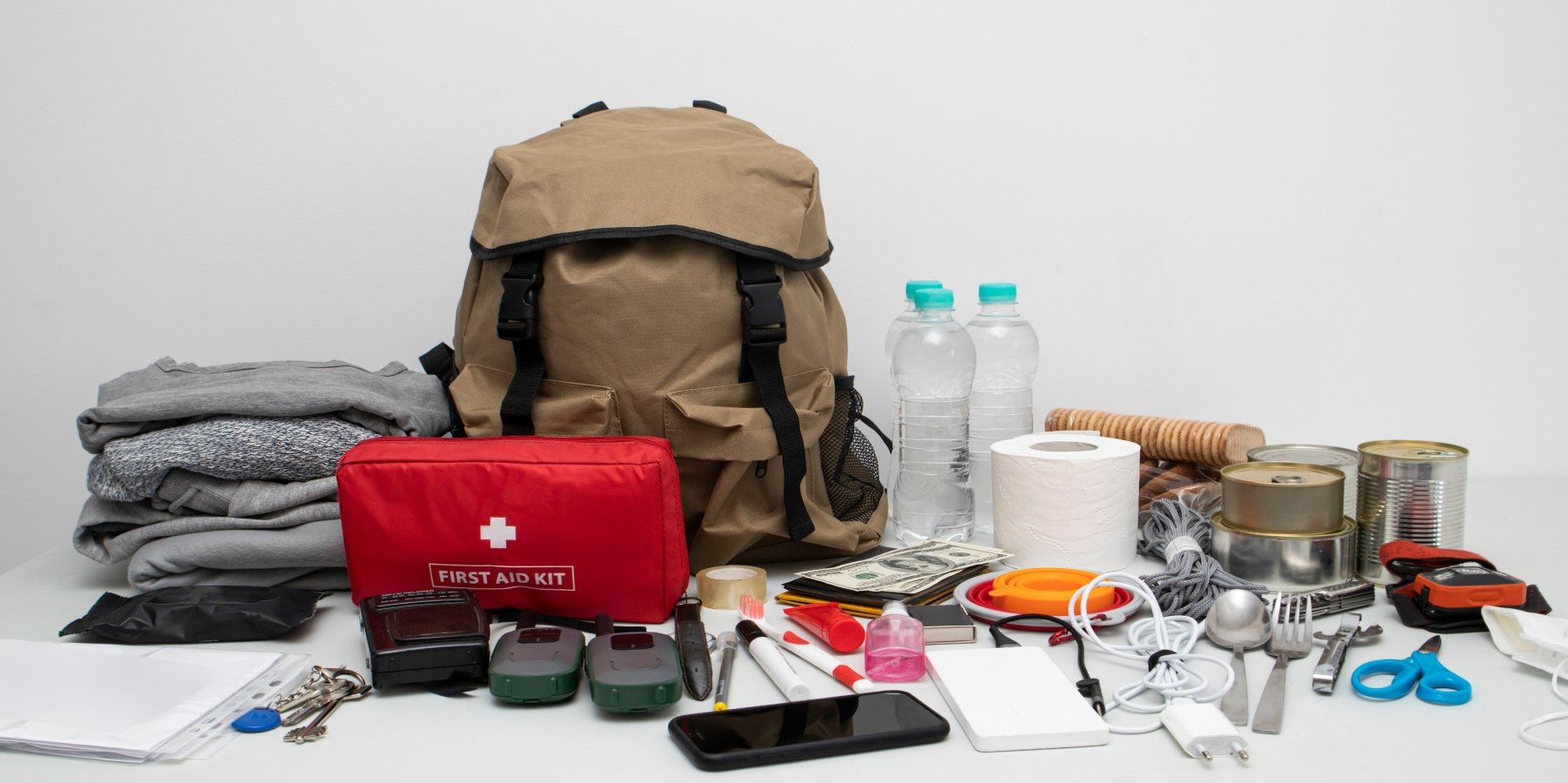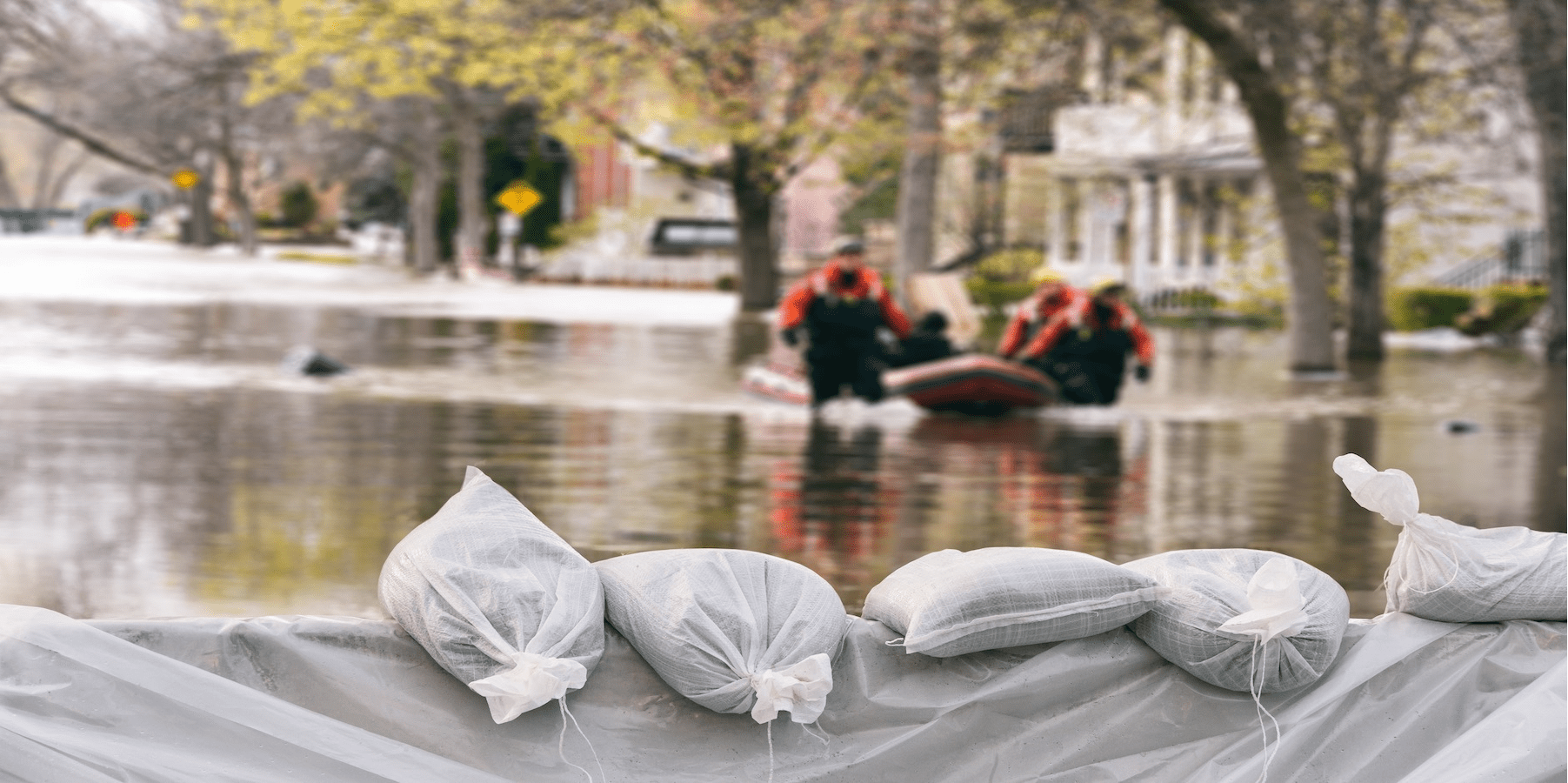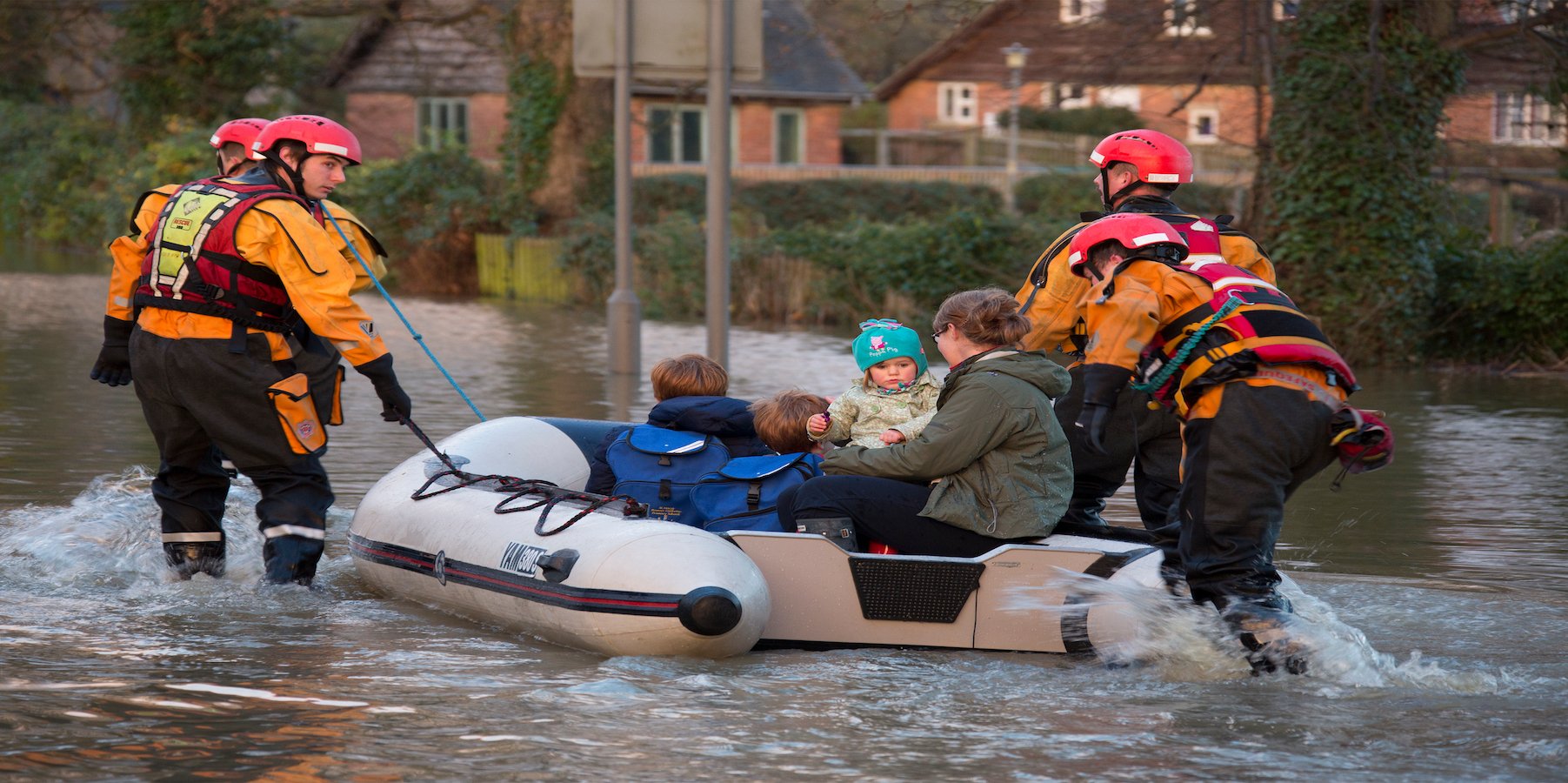

Be Prepared
for Potential Emergency
Emergency Kit Checklist
- share this page by email
- share this page on Facebook, opens in a new tab
- share this page on X (Twitter), opens in a new tab
- share this on Linked In, opens in a new tab
Whether you have to stay in or get out, packing a small emergency kit will help you get through. Keep it in a safe place at home where you can reach it easily. Your kit should be kept in a waterproof bag and the top ten things to include are:
- Your household emergency plan, including emergency contact numbers
- Battery torch with spare batteries, or a wind-up torch
- First aid kit
- Important documents like birth certificates and insurance policies
- Bottled water and ready-to-eat food that won’t go off. Pack a can opener if needed
- Spare keys to your home and car
- Spare glasses or contact lenses
- Toiletries and details of important medicines
- Pencil and paper, penknife, whistle
- Pet supplies
If you have to leave your home, and there’s time to gather them safely, you should also think about taking:
- Essential medicines
- Mobile phone and charger
- Cash and credit cards
- Spare clothes and blankets
- Pets
- Games, books, a child's special toy
If the emergency means it is not safe to go out, the advice is usually to:
Go in, stay in, tune in.
Go indoors and close all windows and doors and tune in to local radio, TV or the internet, where public information and advice from the emergency responders will be broadcast.

Emergency Kit Checklist
- share this page by email
- share this page on Facebook, opens in a new tab
- share this page on X (Twitter), opens in a new tab
- share this on Linked In, opens in a new tab
Whether you have to stay in or get out, packing a small emergency kit will help you get through. Keep it in a safe place at home where you can reach it easily. Your kit should be kept in a waterproof bag and the top ten things to include are:
- Your household emergency plan, including emergency contact numbers
- Battery torch with spare batteries, or a wind-up torch
- First aid kit
- Important documents like birth certificates and insurance policies
- Bottled water and ready-to-eat food that won’t go off. Pack a can opener if needed
- Spare keys to your home and car
- Spare glasses or contact lenses
- Toiletries and details of important medicines
- Pencil and paper, penknife, whistle
- Pet supplies
If you have to leave your home, and there’s time to gather them safely, you should also think about taking:
- Essential medicines
- Mobile phone and charger
- Cash and credit cards
- Spare clothes and blankets
- Pets
- Games, books, a child's special toy
If the emergency means it is not safe to go out, the advice is usually to:
Go in, stay in, tune in.
Go indoors and close all windows and doors and tune in to local radio, TV or the internet, where public information and advice from the emergency responders will be broadcast.
Sandbags
The Council will endeavour to deploy sandbags to properties deemed at risk of being affected by floodwater. The distribution of sandbags will be in accordance with the priorities below and the resources available at the time, and providing it is safe to do so.
- Prevent loss of life or serious injury
- Protection of vulnerable populations
- Protection of residential property with ingress of water into the property (priority to vulnerable people)
Pre-deliveries of sandbags to individual properties and businesses cannot be accommodated.
For safety reasons at no time will business/property owners or members of the public be allowed to collect sandbags directly from any of the council depots.
Disposal of used sandbags will be the responsibility of the home or business owner.
We understand that many communities have been significantly affected by flooding in recent weeks. Please visit our Flooding Recovery page for further information and support.

Sandbags
The Council will endeavour to deploy sandbags to properties deemed at risk of being affected by floodwater. The distribution of sandbags will be in accordance with the priorities below and the resources available at the time, and providing it is safe to do so.
- Prevent loss of life or serious injury
- Protection of vulnerable populations
- Protection of residential property with ingress of water into the property (priority to vulnerable people)
Pre-deliveries of sandbags to individual properties and businesses cannot be accommodated.
For safety reasons at no time will business/property owners or members of the public be allowed to collect sandbags directly from any of the council depots.
Disposal of used sandbags will be the responsibility of the home or business owner.
We understand that many communities have been significantly affected by flooding in recent weeks. Please visit our Flooding Recovery page for further information and support.
Loss of Utilities
- share this page by email
- share this page on Facebook, opens in a new tab
- share this page on X (Twitter), opens in a new tab
- share this on Linked In, opens in a new tab
Power cuts and loss of other utilities usually happen suddenly and with little warning. While utility companies in Wales have well-tested plans in place to deal with this, we can all take simple steps to ensure we are better prepared for a short period without electricity, gas or mains water supplies.
- Having a well-stocked emergency kit at home will help you through until things get back to normal.
- A battery powered radio will help you stay in touch with the news following a power failure.
- Keep mobile phones, laptops or tablets fully charged, so you will have use of battery power for a short time at least if there is a power cut.
- A non-mains powered landline telephone will help you stay in touch during any disruptions to your power supply.
- Make a list of all the telephone numbers you might need, and keep them handy.
The utility companies work closely with local authorities to make sure that vulnerable people get the support they need during any disruptions to normal service. You should let your supplier know if you have a disability or are chronically sick, or you depend on a continuous supply of power for medical equipment or mobility equipment such as stair lifts and hoists.
You should also contact your supplier if you are visually impaired or have hearing difficulties, or you are of state pensionable age, or you have other specific requirements. If you have elderly relatives or neighbours who might need help during a power cut, please check up on them. More support and advice is available from your gas, electricity, water and communications suppliers.

Loss of Utilities
- share this page by email
- share this page on Facebook, opens in a new tab
- share this page on X (Twitter), opens in a new tab
- share this on Linked In, opens in a new tab
Power cuts and loss of other utilities usually happen suddenly and with little warning. While utility companies in Wales have well-tested plans in place to deal with this, we can all take simple steps to ensure we are better prepared for a short period without electricity, gas or mains water supplies.
- Having a well-stocked emergency kit at home will help you through until things get back to normal.
- A battery powered radio will help you stay in touch with the news following a power failure.
- Keep mobile phones, laptops or tablets fully charged, so you will have use of battery power for a short time at least if there is a power cut.
- A non-mains powered landline telephone will help you stay in touch during any disruptions to your power supply.
- Make a list of all the telephone numbers you might need, and keep them handy.
The utility companies work closely with local authorities to make sure that vulnerable people get the support they need during any disruptions to normal service. You should let your supplier know if you have a disability or are chronically sick, or you depend on a continuous supply of power for medical equipment or mobility equipment such as stair lifts and hoists.
You should also contact your supplier if you are visually impaired or have hearing difficulties, or you are of state pensionable age, or you have other specific requirements. If you have elderly relatives or neighbours who might need help during a power cut, please check up on them. More support and advice is available from your gas, electricity, water and communications suppliers.
Community risk register
- share this page by email
- share this page on Facebook, opens in a new tab
- share this page on X (Twitter), opens in a new tab
- share this on Linked In, opens in a new tab
A statutory requirement under the Civil Contingencies Act 2004 is the consideration of the likelihood and impact of a range of hazards occurring within the Dyfed Powys Police Force area. Emergencies are obviously something all of us hope will never happen, but if one were to occur in Carmarthenshire we want to be as well prepared as we can be.
To help us decide where we should concentrate our efforts in emergency planning terms, it is important that we continue to assess the potential risks to our County. The importance of risk assessment is emphasised by the Civil Contingencies Act 2004 (CCA). A statutory requirement under the CCA is the consideration of the likelihood and impact of a range of hazards occurring within the Dyfed Powys Police Force area.
This work is an ongoing process. The risk assessments included in the register will only cover non-malicious events (i.e. hazards) rather than threats (i.e. terrorist incidents).
Typical hazard scenarios that are being considered include, for example:
- Transport accidents
- Severe weather
- Flooding
- Industrial accidents and environmental pollution
- Human health
- Animal health
- Industrial technical failure
Risk assessment is not a static process and is subject to constant review. The inclusion of hazards or scenarios does not mean that the Local Resilience Forum believes the risk will materialise, or that if it were to do so, it would be at that scale. The risk scenarios are rather reasonable worse case assumptions upon which the risk assessment is based.
Downloads:

Community risk register
- share this page by email
- share this page on Facebook, opens in a new tab
- share this page on X (Twitter), opens in a new tab
- share this on Linked In, opens in a new tab
A statutory requirement under the Civil Contingencies Act 2004 is the consideration of the likelihood and impact of a range of hazards occurring within the Dyfed Powys Police Force area. Emergencies are obviously something all of us hope will never happen, but if one were to occur in Carmarthenshire we want to be as well prepared as we can be.
To help us decide where we should concentrate our efforts in emergency planning terms, it is important that we continue to assess the potential risks to our County. The importance of risk assessment is emphasised by the Civil Contingencies Act 2004 (CCA). A statutory requirement under the CCA is the consideration of the likelihood and impact of a range of hazards occurring within the Dyfed Powys Police Force area.
This work is an ongoing process. The risk assessments included in the register will only cover non-malicious events (i.e. hazards) rather than threats (i.e. terrorist incidents).
Typical hazard scenarios that are being considered include, for example:
- Transport accidents
- Severe weather
- Flooding
- Industrial accidents and environmental pollution
- Human health
- Animal health
- Industrial technical failure
Risk assessment is not a static process and is subject to constant review. The inclusion of hazards or scenarios does not mean that the Local Resilience Forum believes the risk will materialise, or that if it were to do so, it would be at that scale. The risk scenarios are rather reasonable worse case assumptions upon which the risk assessment is based.
